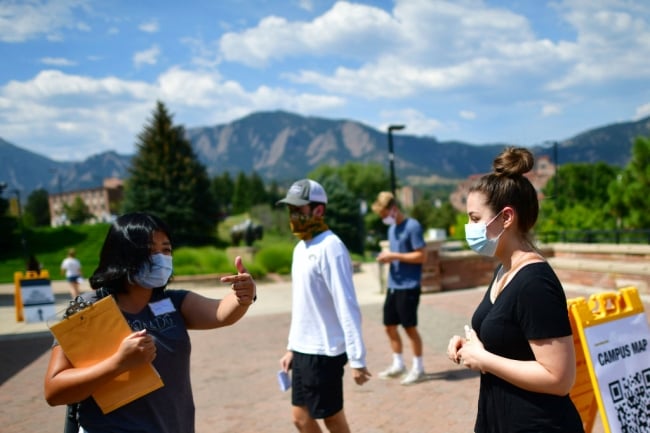You have /5 articles left.
Sign up for a free account or log in.

A staff member at the University of Colorado at Boulder directs a first-year student arriving on campus on Aug. 18.
Mark Makela/Getty Images News via Getty Images
“Front line” student affairs professionals -- including residence life and student activities staff, student conduct officials, and academic advisers -- are often the first people at colleges and universities to communicate with and support families and campuses when there's an emergency involving a student, such as a health crisis or death.
As campuses reopen during the coronavirus pandemic, these employees are often responsible for coordinating quarantine housing and mask distribution and managing conduct hearings for students who break social distancing and other public health rules. And like faculty members, these staff are also more likely to interact with students. But compared to the strong opposition to reopen campuses and in-person instruction widely voiced by faculty members across the country, lower- and entry-level student affairs staff members have remained relatively quiet -- at least publicly -- about health and safety concerns related to the pandemic, despite some of their jobs putting them in regular physical contact with large numbers of students.
Lacking the job security of tenured faculty members backed by influential unions and faculty senates and empowered by shared governance policies, student affairs staff tend to be young and in the early stages of their careers -- and have fewer job protections. Instead of speaking out, they're working to carry out and improve return-to-campus plans and retain their jobs amid widespread budget and program cuts, faculty layoffs, and staff reductions due to the financial havoc the pandemic has created for higher ed.
Kevin Kruger, president of NASPA: Student Affairs Administrators in Higher Education, said student affairs staff members are keeping their heads down and executing reopening plans focused on student safety because they care about students, some of whom will be returning to campuses no matter what instruction model their colleges are operating under. These staff members are also less inclined than faculty members to challenge the decisions of their colleges' president, trustees or executive leadership teams, he said. They also do not have the same union protections as faculty members.
“The inner conflict with this is in student affairs, people go into it because they love students,” Kruger said. “They’re excited to come back to campus, but they’re anxious for their own health and safety and that of the students they’re working with … No one feels like this is the best situation to be in, and some probably feel like they have no choice.”
Kruger said it's not generally common for student affairs staff members to be unionized unless they work in a state where such representation is contractually obligated.
"It's not something that's part of the practice for those kinds of jobs," he said. "You might see it more in trade jobs, but these are professional-level jobs."
T. J. Logan, associate vice president for student affairs at Temple University in Philadelphia, said conversations about college reopenings among student affairs leaders who supervise entry-level staff and others are deeply complicated because the departments provide services for vulnerable students and jobs for vulnerable campus workers.
While some people who work in higher ed simply want to “keep campuses closed and protect people’s health over everything,” student affairs staff have to consider students who are food or housing insecure, or don't have reliable internet access, when they’re not on campus, Logan said. What's more, food service workers and custodial and housing staff would lose their jobs if residence and dining halls were to close completely, he said.
“For a lot of staff, home happens to be campus,” Logan said. “Hall directors whose home, food and livelihood is tied into this idea that they’re going to serve students on campus. They have a lot at stake in these conversations and situations … We have to balance our responsibility to respect and serve those folks and to acknowledge the fears of those folks every day on campus.”
Temple is in its first week of a “de-densified” move-in process for students living in campus residence halls during the fall semester and is limiting the number of in-person classes students will attend. Instead of being publicly vocal about their health and safety concerns, students affairs staff members have been speaking out internally and leading difficult discussions within their departments in order to improve -- rather than outright oppose -- reopening plans, Logan said.
“Staff by designation on a college campus are often the least protected group,” he said. “It’s not that they’re not fighting those good fights, but it’s that they don’t have a shield around them to talk about it or write about it in a way that other entities might be able to.”
Sachet Watson, assistant director of the Office of Student Diversity and Inclusion at Indiana University's School of Public Health in Bloomington, Ind., said most student affairs professionals, such as herself, are at-will employees.
She said she feels comfortable sharing her concerns about the pandemic and other issues with her supervisor. The Bloomington campus is welcoming students back to residence halls for the fall semester with a hybrid in-person and online instruction model. Watson said she is reducing the amount of face-to-face contact she'll have with students at her office by adding virtual office hours.
COVID-19 outbreaks at the University of North Carolina at Chapel Hill and the University of Notre Dame this week elevated her concerns about reopening, "but at the end of the day I’m going to show up for my students," Watson said.
"I’m a person where my heart is for the field I’m in," Watson said. Still, she's worried about student affairs colleagues who live in residence halls, "people who are academic advisers now having an influx of appointments, people trying to look out for their health … Student affairs folks can sometimes be taken for granted at a national level. I’m blessed in my position that I feel supported."
Eric Stoller, a higher education consultant (and former student affairs and technology blogger for Inside Higher Ed), who has been advocating for colleges to stay closed and continue with remote instruction this fall, said he has received messages and seen private social media posts from student affairs staff members fearful of losing their jobs if they speak out about their colleges' reopening plans. He has been urging them on social media to share their thoughts about colleges reopening. He tells them the risk is worth taking to protect their lives and those of students.
“I think if you’re ethically connected to student affairs and the vision of your institution, you have to speak out,” Stoller said. “There’s no going back and hitting reset. You’re going to see a huge surge in COVID-19 and you’re not going to be able to walk back the fact that you thought masks and stickers on the floor and Plexiglas were going to save the day.”
But Kruger said the economic impact of the pandemic on colleges has hit student affairs departments and the market for jobs in that sector exceptionally hard, with more layoffs and furloughs on the horizon.
Stoller understands the desire to stay quiet on these issues under such economic conditions; job loss means losing health-care coverage during the pandemic, and for residence life staff members, it could also mean losing housing.
Kruger said there’s “no doubt” there will be a financial fallout if colleges that reopen their campuses to students this fall have to change course and send students home and return to remote education.
Chris Moody, executive director of the American College Personnel Association, or ACPA, echoed this point. He's already seeing the effects in ACPA’s membership numbers; only about 20 percent of student affairs and higher education professionals renewed their memberships in July, Moody said.
“When you’re looking at how finances roll downhill in the times of crisis, I think student affairs will be hit very hard,” he said.
Both ACPA and NASPA have already shifted their annual conferences, set for March of next year, to an online format, partially because of travel restrictions on student affairs staff members and institutional budget restraints. Lower- and entry-level student affairs staff members are already among the lowest-paid professional positions on campus despite doing some of the most comprehensive and risky work, Moody said.
The average salary for a residence life manager with room and board included, for example, was $36,674 during the 2018-19 academic year, according to the most recently available data from the College and University Professional Association for Human Resources. In comparison, a dean of students, who typically leads the student affairs department, had an average salary of $105,255 in 2018-19, according to the database.
The pandemic has only expanded the work that these front-line staff members are being asked to do and further limited colleges’ ability to pay them, Moody said.
“Student affairs folks are really exhausted right now,” Moody said. “They’re heading into this new year really, really tired … They’ve been planning for all these scenarios throughout the summer, to have things change so quickly. It seems like every day is a new twist, having to figure it out.”
A student affairs professional who did not want to be identified and who works for a technical college in the northeastern United States said if she went public with her concerns about students flouting health and safety rules on her recently reopened campus, her colleagues and superiors would “black sheep” her.
She said her institution, which enrolls about 1,200 students and is located in a state not severely impacted by the coronavirus, is taking the right precautions to keep students safe. After one student living on campus tested positive for COVID-19 last week, they quickly removed the student from the dorm, which is where she and other student affairs professionals have been living and are “on duty” to be accessible for students.
The staff member has diabetes and is at increased risk of becoming seriously ill from the coronavirus, but she doesn’t feel in “imminent danger.” Her biggest concern is the trust officials are putting in students to abide by the college’s rules for social distancing and daily COVID-19 symptom reporting.
“I was in the boat of, ‘we shouldn’t be open in the first place,’” the staff member said. “There are some days where I keep going back to that, but … we staggered the move-ins, we did multiple testings, we’re taking the right steps and I think our college is handling [this] much better than others have.”
If her institution were to pivot to entirely online instruction and close campus, she would likely be able to continue in her role, which includes coordinating student activities. But her colleagues who work solely in residential life would be “sorry out of luck,” she said.
“Really it’s about job security,” the staff member said. “There are so many things that go along with this. It’s not just about if you get the virus and die.”








